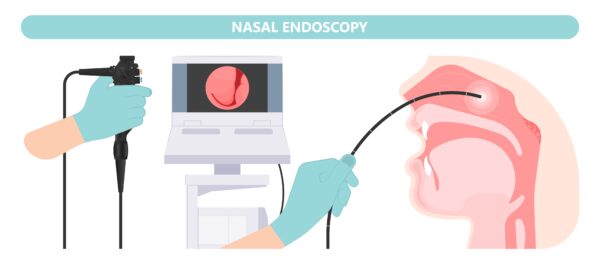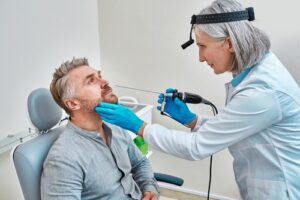
menu

Posted in Uncategorized | April 14, 2023

Are you having difficulty breathing? Do you suffer from constant congestion?
Problems in your sinuses or nose can cause congestion, facial pain, breathing difficulties, headaches, and other uncomfortable symptoms. Nasal endoscopy is a procedure that enables your otolaryngologist or ENT specialist to see the inside of your nose and sinuses.
A nasal endoscopy can determine what’s causing your symptoms and determine structural issues in your nose. Often, nasal endoscopy is required to provide you with the relief you need.
Keep reading to learn more about nasal endoscopy, why you may need it, and what happens before, during, and after the procedure.

Nasal endoscopy is performed by inserting an endoscope into your nose. Endoscopes can be flexible or rigid and have a tiny light and camera.
Your ENT specialist at Specialty Care Institute may connect the endoscope to a computer screen or look through the eyepiece on the endoscope. A nasal endoscope is usually done in-office and can diagnose nasal and sinus issues.
Without a nasal endoscope, your ENT specialist can check your nose with a headlight and speculum, a technique called anterior rhinoscopy. However, anterior rhinoscopy only provides a limited or keyhole view of your nasal cavity.
Nasal endoscopy offers unmatched visualization capabilities. Your ENT specialist can see straight ahead from the tip of a zero-degree nasal endoscope.
With the angled (35/45/70 degree) endoscope, your otolaryngologist can see around corners and bends deep into your nose and sinuses. An endoscope’s advanced visualization capabilities optimize your ENT specialist’s ability to diagnose your condition accurately.
You may need a nasal endoscopy if you have the following:

Nasal endoscopy can also be used to extract a tissue sample for a biopsy or remove a foreign object from the nose of a small child.
Before having a nasal endoscopy, tell your ENT specialist about all medications you’re currently taking, including supplements, over-the-counter medicines, and herbs. Your doctor will inform you if you should stop taking medications before your procedure.
Unless instructed otherwise, you can drink and eat as you usually do before your test. Your ENT specialist at Specialty Care Institute might provide more instructions about what to do before your nasal endoscopy.
Your doctor will start by spraying a topical decongestant into your nose. The decongestant helps minimize swelling and lets the endoscope pass easily through your sinuses and nasal cavity.

You’ll also have your nose sprayed with an anesthetic to numb it. Numbing your nose makes nasal endoscopy more comfortable.
During the procedure, you’ll sit upright with your head slightly tilted backward. After numbing your nose, your ENT specialist will carefully guide the endoscope into your nose, one nostril at a time.
If you experience any discomfort, let them know. You might require a smaller-sized endoscope or more anesthesia.
As the endoscope is gently pushed forward, your doctor will be able to see any problems clearly. The process is repeated two or more times on each nostril.
Each pass lets your ENT specialist view different parts of your sinuses and nasal cavity. Your ENT specialist will take a tissue sample for a biopsy if needed.
Finally, the endoscope is gently removed from your nose. Your ENT specialist may put gauze into your nose to aid with any bleeding.
The test typically takes a minute or two. There’s no downtime, so you can resume your daily routine the same day.
Your ENT specialist might discuss the results with you immediately after your endoscopy. Alternatively, you may need to schedule a follow-up appointment to discuss your results and treatment options.
It’s essential to follow post-procedure instructions provided by your doctor to avoid any complications. You may need to rinse your nose using saltwater to soothe your nasal passages.
If this is necessary, you’ll be told how to do this. After the nasal endoscopy, you might have a mild nosebleed that resolves independently. Be sure to inform your ENT specialist if the nosebleed doesn’t go away.
Nasal endoscopy is a very safe procedure. Still, complications can happen in rare cases.
Your ENT specialist will closely monitor you for any side effects from your procedure. In addition to a slight nosebleed, you might also have a sore throat. If you do have one, it should go away quickly.
Although rare, you may feel faint or briefly pass out. If you do, you’ll remain at Specialty Care Institute until we clear you to return home.
In rarer cases, some patients react adversely to the decongestant or anesthetic.

Recurring nasal or sinus issues can cause uncomfortable symptoms and even reduce your quality of life. Getting a nasal endoscopy at Specialty Care Institute can help alleviate your symptoms and offer a lasting solution.
Are you tired of dealing with frequent sinus or nasal problems? To find long-term relief, schedule your appointment today at Specialty Care Institute in Arlington Heights, Barrington, Elgin, or Hoffman Estates, IL.